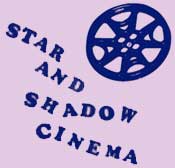Schadenfreude
Dir. Various Artists (compiled by Tirdad Zolghadr. BetaSP), 2006
-
Thu 21 February 2008 // 19:30
/ Cinema
The programme tonight is a series of short films from international artists from Turkey to Mexico, exploring questions of voyeurism and conflict - themes any activist photographer or film-maker must come to terms with.
The programme was curated by Tirdad Zolghadr, and has so far toured in Argentina, Canada, Netherlands, Germany and accross several British cities.

The Programme
This is how Tirdad Zolghadr presents Schadenfreude:
"These days, projects reflecting on the present context of military violence constitute a dilemma very typical of political activism as a whole. It seems one has to choose between sentimentalized / didactic / (counter) propagandistic takes on the issue OR the even more depressing option of retreating to insular, strictly local navel-gazing. To de-spectacularise can hardly be a viable alternative either. The challenge here, I find, is not that of summoning selfless goodwill or progressive content, but that of finding intelligent forms of voyeurism, i.e. a mode of visual production that faces up to the inevitable, to its own strategies of entertainment or objectification, without any apologetic backflips or self-reflexive mise-en-abîme - strategies that are hard-hitting without being retrograde, and that elude simple notions of solidarity and empathy in favor of an analysis of the very fascination for the outlandish, be it touching or violent or both.
In terms of structure, the works in this programme, without ever succumbing to storytelling narrative, all aim for certain patterns of suspense or anticipation, with most of them resorting to difference in repetition, at times subtle, at times slightly overbearing. All are rather understated in their visual ingredients, making their point on the frisson of flinching in wry, succinct ways, rather than elaborate filmic sophistication."
The films
AHMET ÖGÜT
CUT IT OUT (Turkey, 2004, 2mins)
Ögüt's Cut it Out is a sardonic take on what is perhaps the newest TV genre that can safely lay claim to any political impact, one that has already established its own codes and conventions as a genre – the self-staged statement on the part of armed insurgents. Ögüt's film employs these codes in a manner that is striking and humorous, though it remains open on whom the joke is – the genre, the audience, or the artwork itself. Courtesy of the artist.
CHRISTOPH BÜCHEL
AC 130 GUNSHIP (Switzerland, 2004, 9mins)
Büchel's AC 130 Gunship, in some ways a cornerstone of the programme, is an edited documentation of a US attack on a building complex somewhere in rural Afghanistan. The violent nonchalance of the off-voices of military pilots becomes all the more chilling as one realises that the brutality unfolding on the screen is irresistibly entertaining. Courtesy of the artist and Hauser & Wirth Zürich.
AKRAM ZAATARI
SAIDA. JUNE 6, 1982 [extract] (Lebanon, 2004, 4mins)
Zaatari's, Saida. June 6, 1982, is perhaps his one most elegant rendition among the many visual inquiries into the value of documentation and the possibility of historical memory, a piece that renders the bomb explosions of that day as beautiful as they were terrifying, by way of an ingenious juxtaposition of only six photographs Zaatari took of the attack. Courtesy of the artist and Sfeir Semler Gallery
MIGUEL CALDERON
INVERTED STAR (Mexico, 2002, 4mins)
Calderon's Inverted Star departs from war issues, turning to a more general inquiry into questions of sensationalism and testimony. For this piece, Calderon posted announcements in newspapers offering a small sum to anyone possessed by the devil who would be willing to be filmed. It is a brilliant take on poOrnography and the exploitation of misery to aesthetic / artistic ends – but without forgetting crucial questions of self-staging and strategy on behalf of the actors. Courtesy of the artist.
SENER ÖZMEN
OUR VILLAGE (Turkey, 2004, 7mins)
Özmen's Our Village is the most atmospheric or uncanny of the works in the programme, using the high-pitched cheerfulness of children's songs, and the benign, innocent demeanor of two little girls, to create a very crass and simple - but perhaps all the more effective - contrast with a depressing tale of rural dejection. Courtesy of the artist.
ERIK VAN LIESHOUT
AWAKENING [single channel version of installation](The Netherlands, 2005, 12mins)
Van Lieshout's Awakening is a typically hard-hitting portrayal of the artist's social surroundings in the wake of shifting social parameters regarding homosexuality, xenophobia and nationalism. Courtesy of the artist.
MARCIN KOSZALKA
SUCH A NICE BOY I GAVE BIRTH TO (Poland, 1999, 25mins)
Koszalka's, Such a Nice Boy I Gave Birth to is a portrayal of the sheer brutality of the filmmaker's relationship to his parents, one of undying humiliation and abuse. It is by far the longest film in the selection, and resorts to persistent, almost insufferable repetition – repetitions only gradually undermined by subtle narrative developments throughout the film – as a manner of getting its point across. Courtesy of the artist.
For more information, have a look at the LUX page on this programme here.
Schadenfreude is a German word meaning 'pleasure taken from someone else's misfortune'.
